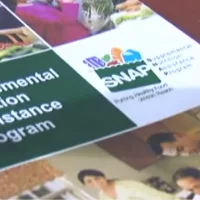
Changes to the program could also result in thousands of low-income families losing access to federal assistance that helps them buy food
BY: CLARA BATES
Missouri Independent
Missouri could lose around $400 million in federal funding for food assistance under a plan approved by Congressional Republicans Thursday — which would strain the state budget and likely strip thousands of low-income families of food aid across the state.
Those cost-shifts could put pressure on the legislature to slash the state’s SNAP program or fill in the federal funding gaps by cutting other state services.
Roughly one-tenth of Missouri’s population, or over 650,000 people, receive SNAP benefits.
“This is about parents not eating so their kids can, or children going to school hungry,” said Amy Blouin, president and CEO of the progressive think tank Missouri Budget Project.
Another provision in the bill that cleared the U.S. House would create stricter work reporting requirements for SNAP, which could cut or reduce benefits for 150,000 Missourians, the Center on Budget and Policy Priorities estimates.
“This bill would raise costs on families and make it harder for Missourians of all ages to meet their basic needs,” said Blouin.
The legislation aims to extend President Donald Trump’s 2017 tax cuts, a move the Congressional Budget Office projected would decrease resources for low-income families while increasing resources for top earners. The package passed in the House early Thursday could cut $267 billion from SNAP over 10 years, according to the CBO’s preliminary analysis earlier this week. It would also cut over $600 billion from Medicaid.
Under the proposal passed by the House, SNAP costs would be shifted to the states starting in 2028.
The federal government currently covers 100% of SNAP benefits and 50% of the administrative costs. Under the proposal, states would need to cover between 5% and 25% of benefits and 75% of administration.
The share of costs the federal government shifts to states would hinge on states’ error rates, meaning the rate at which states over or underpay benefits recipients. States would need to pay a greater portion of the benefits depending on how high their error rate is.
In 2023, the most recent data available, Missouri’s error rate was 10%, which would mean the highest cost share. Missouri would need to cover 25% of the cost of benefits.
A Department of Social Services spokesperson said more recent data isn’t available.
Missouri’s Republican House delegation voted for the bill and Democrats voted against it.
Republican U.S. Rep. Mark Alford said the bill “strengthens and restores the integrity” of SNAP in order to “ensure it is a temporary life vest for the needy — not a lifestyle.”
Democratic U.S. Rep Emanuel Cleaver said the bill amounts to “ ripping health care and food assistance away from vulnerable families, to give another tax break that lines the pockets of billionaires.”
Several parts of the package are expected to change in the Senate and come back to the House for a final vote in the coming months.


